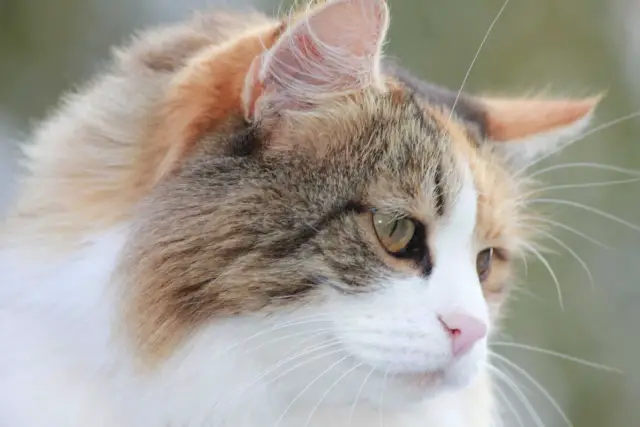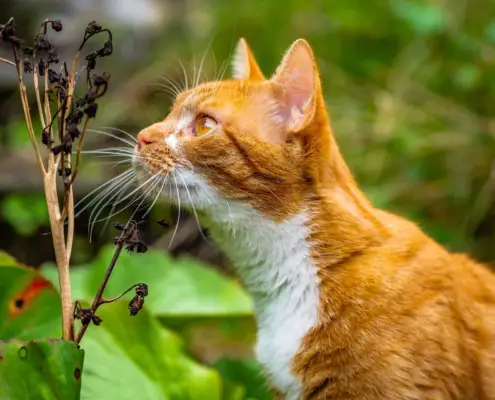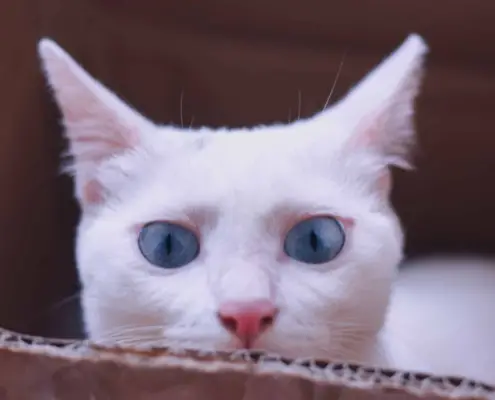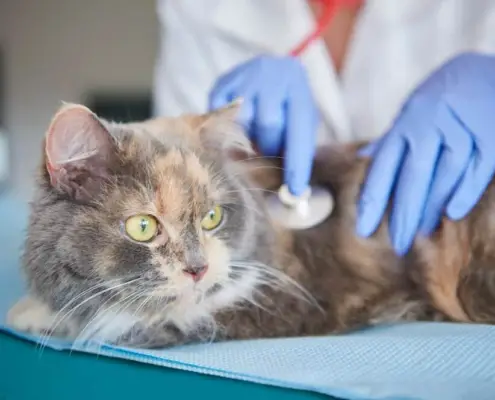
Cats are known for their quirky personalities and behaviors, but what about their digestive system? Do cats fart? This question may seem silly or even gross, but it’s a valid one nonetheless. In fact, understanding feline digestion can give pet owners insight into their cat’s overall health and well-being.
Introduction to Feline Digestion
Before diving into the topic of cat farting, it’s important to understand how a cat’s digestive system works. Cats are obligate carnivores, which means their bodies are designed to process and digest animal protein. Unlike humans and other omnivorous animals, cats lack the necessary enzymes to break down carbohydrates and plant-based foods.
The feline digestive system is relatively short, with food passing through the stomach and small intestine quickly. This is because cats are designed to consume small meals frequently throughout the day, rather than large meals all at once. The large intestine is where the majority of water is absorbed from the food, and the waste products are formed into feces.
The Truth About Cats and Farting
The short answer is yes, cats can and do fart. Just like humans and other animals, cats produce gas as a byproduct of digestion. However, unlike dogs, cats don’t typically have loud, audible farts. In fact, it can be difficult to tell if a cat has passed gas at all.
While it may seem like cats don’t fart much, it’s important to note that excessive flatulence can be a sign of an underlying health issue. Excessive gas can be caused by a variety of factors, including diet, stress, and gastrointestinal problems. If a cat is producing an unusual amount of gas, it’s important to monitor their behavior and talk to a veterinarian if necessary.
What Causes Cats to Fart?
There are several factors that can contribute to cat flatulence. One of the most common causes is diet. A cat’s digestive system is designed to process animal protein, so foods that are high in carbohydrates can be difficult for them to digest. This can lead to increased gas production and flatulence.
Another factor that can contribute to cat farting is stress. Just like humans, cats can experience stress and anxiety, which can have a negative impact on their digestive system. When a cat is stressed, their body releases hormones that can slow down digestion and lead to gas buildup.
Gastrointestinal problems are another potential cause of cat flatulence. Issues like inflammatory bowel disease, intestinal parasites, and food allergies can all lead to digestive issues and excessive gas production.
Common Signs of Flatulence in Cats
As previously mentioned, cats don’t typically have loud, audible farts like dogs or humans. So how can you tell if your cat is experiencing flatulence? Here are some common signs to look out for:
- Unusual odors coming from the litter box or your cat’s rear end
- Increased belching or passing gas
- Changes in appetite or eating habits
- Abdominal discomfort or bloating
- Diarrhea or constipation
If you notice any of these symptoms in your cat, it’s important to monitor their behavior and talk to a veterinarian if necessary.
Is Cat Farting Normal or a Cause for Concern?
While cat farting is normal to some extent, excessive flatulence can be a sign of an underlying health issue. As previously mentioned, diet, stress, and gastrointestinal problems can all contribute to increased gas production in cats.
If a cat is producing an unusual amount of gas or experiencing other symptoms like diarrhea or constipation, it’s important to talk to a veterinarian. These symptoms could be a sign of a more serious underlying condition that requires medical attention.
Understanding the Feline Digestive System
To better understand the causes of cat flatulence, it’s important to have a basic understanding of the feline digestive system. As previously mentioned, cats are obligate carnivores, which means their bodies are designed to process and digest animal protein.
When a cat eats, the food is broken down in the stomach and small intestine. From there, it moves into the large intestine where the majority of water is absorbed and waste products are formed into feces.
The digestive system is complex, and there are many factors that can impact how a cat digests their food. Understanding your cat’s individual needs and digestive system can help prevent flatulence and other digestive issues.
Tips to Prevent Cat Farting
While some level of flatulence is normal in cats, there are steps pet owners can take to prevent excessive gas production. Here are some tips to keep in mind:
- Feed a high-quality, animal protein-based diet
- Avoid foods that are high in carbohydrates or difficult to digest
- Feed small, frequent meals throughout the day
- Provide plenty of fresh water to help with digestion
- Minimize stress and provide a comfortable, low-stress environment
By following these tips, pet owners can help keep their cats healthy and prevent excessive flatulence.
Home Remedies for Cat Flatulence
If your cat is experiencing mild flatulence, there are some home remedies that may help. Keep in mind that these remedies are not a substitute for veterinary care, and should only be used under the guidance of a veterinarian. Here are some home remedies to consider:
- Probiotics: Adding a probiotic supplement to your cat’s diet can help promote healthy digestion and reduce flatulence.
- Digestive enzymes: Digestive enzymes can help break down food and reduce the amount of gas produced during digestion.
- Fennel: Fennel is a natural remedy that can help reduce gas and bloating in cats.
Again, it’s important to talk to a veterinarian before trying any home remedies or supplements.
When to Seek Veterinary Help for Excessive Cat Farting
If your cat is experiencing excessive flatulence or other digestive symptoms, it’s important to talk to a veterinarian. A vet can perform a thorough exam and run diagnostic tests to determine the underlying cause of the flatulence.
If a more serious underlying condition is suspected, a vet may recommend further testing or treatment. In some cases, prescription medications or a change in diet may be necessary to manage the issue.
Cats May Not Fart as Much as You Think
While cat farting may not be the most pleasant topic, it’s an important one nonetheless. Understanding feline digestion can give pet owners insight into their cat’s overall health and well-being.
While some level of flatulence is normal in cats, excessive gas production can be a sign of an underlying health issue. By following a high-quality diet, minimizing stress, and seeking veterinary help when necessary, pet owners can help keep their cats healthy and happy.
So the next time you hear a faint noise coming from your cat’s rear end, remember that it’s a normal part of their digestive process. And who knows, maybe your cat’s farts will become a quirky part of their personality that you can’t help but love.
If you enjoyed my article, I would appreciate you sharing it with your network.

Sima Ndlebe
Sima writes for CatBuzz. He is interested in Cats, Health and Fitness, and Entrepreneurship.
Published: 5 December 2023
Related Articles
Disclaimer
The content found on CatBuzz.org is presented on an "as is" basis and is intended for general consumer information and education purposes only. Any utilization of this information is voluntary and solely at the user's own risk.
None of the articles or content should be regarded as, or used in place of, veterinary medical advice, diagnosis, or treatment. The information provided on the website is purely for educational and informational intentions and should not be considered a substitute for professional guidance from a veterinarian or other qualified expert. The articles are designed to inform consumers about veterinary healthcare and medical matters that may impact their cat's daily life. It should be noted that this website and its services do not constitute the practice of any form of veterinary medical advice, diagnosis, or treatment. CatBuzz.org explicitly disclaims any liability for any direct or indirect damages or losses that may arise from the use of or reliance on the information contained within the content.
Consumers must consult a veterinarian, veterinary specialist, or another qualified veterinary healthcare provider when seeking advice regarding their cat's health or medical conditions. It is important not to ignore, avoid, or postpone seeking medical advice from a veterinarian or other qualified veterinary healthcare provider solely based on information obtained from this website. If you believe that your cat may be experiencing a medical issue or condition, it is imperative to promptly contact a qualified veterinary healthcare professional.



